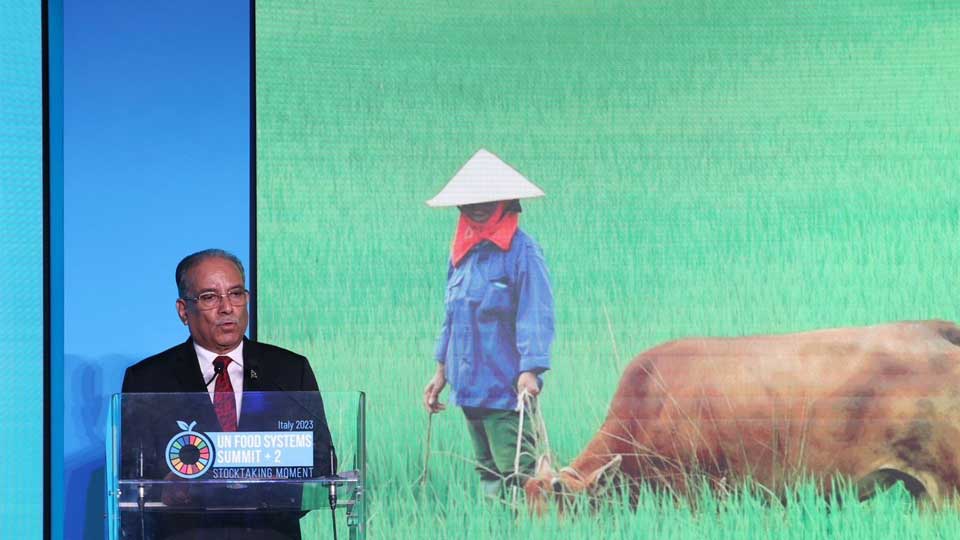
Prime Minister Pushpa Kamal Dahal ‘Prachanda’ has stressed the need to fight the battle against hunger and food insecurity more resolutely while achieving SDG 2 on zero hunger still looks uncertain.
In his keynote address to the Plenary Session on Food Systems Transformation in Practice on the sidelines of the UN Food Systems Summit-2023 in Rome of Italy on Tuesday, the Prime Minister said,” Transforming our food systems is akin to building a fortress against hunger.”
Presenting the assessment to the progress made so far since the Food Systems Summit in 2021, he said affording healthy diet was difficult for almost 3 billion people in 2020. Millions were suffering from acute hunger. The COVID-19 pandemic only worsened this scenario, while the climate crisis and conflicts on different parts further accentuated the problem.
As he apprised the Session, modern food systems fall short in providing a pathway for sustainable future. Current food-systems have eroded biodiversity, exacerbated inequality, and propelled unsustainable production and consumption. Moreover, such systems have worsened climate change by contributing to greenhouse gas emissions and loss of indigenous practices.
He went on to say that a deterioration in public health had been experienced in many cases with increasing numbers of non-communicable diseases. “Therefore, our endeavour to transformation of food system should be able to address such multiple challenges.”
It is of equal importance to realise that the food system plays a vital role in improving livelihoods, advancing economic development, and enhancing the overall quality of life, according to the Prime Minister who utlised the forum to announce that such transformation would lead to more equitable, resilient and sustainable food systems.
Talking about few specific measures that Nepal has taken to transform the food systems, he said, “We are fully committed to the implementation of the Right to Food and Food Sovereignty Act, 2018, a strong legal framework for sustainable food systems in Nepal. It is an important instrument for improving food governance and policy coherence in health, agriculture, food security and nutrition.”
He said Nepal adheres to the Act and aim to strengthen its efforts in achieving a more equitable and resilient food system that ensures the right to food for all citizens.
The Prime Minister mentioned that following the UN Food Systems Summit 2021, Nepal held national and provincial level food systems dialogues with relevant stakeholders to examine the existing food systems, assess vulnerabilities, and design pathways to transform them.
“We, then, prepared Food Systems Transformation Strategic Plan (2022-2030) to streamline and link the actions towards 2030 agenda for achieving all Sustainable Development Goals,” he said.
Prime Minister Dahal apprised the Session that Nepal remained committed to develop a sustainable food chain for affordable, safe, healthy, and nutritious diets, additionally focusing on the improvement of agriculture productivity, supporting local farming, and investing in better storage system for minimizing waste. He said Nepal encourages better public-private partnership for improving infrastructure and value chains.
“Revitalizing local indigenous food systems is our priority and there is increasing investment and interest in indigenous food grains like millet,” he said.
Stating that transforming food systems faced a myriad of challenges including low productivity, high post-production losses, frequent climatic shocks and weak climate resilience, he said that Nepal as an LDC was marred by additional challenges such as lack of adequate storage, markets, cold chains, low levels of mechanization, high production costs, weak market linkages, and uneven distribution systems in its efforts for transformation of food systems.
“Funding gap is the biggest challenge to implement planned activities for the capacity development of government and other stakeholders at different levels of food systems transformation,” he said, urging all to join hands in Nepal’s collective endeavor to transform the food system which as he stated is not only essential for ensuring people’s physical well-being but also for empowering community, conserving environment and building of a sustainable future for all.